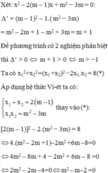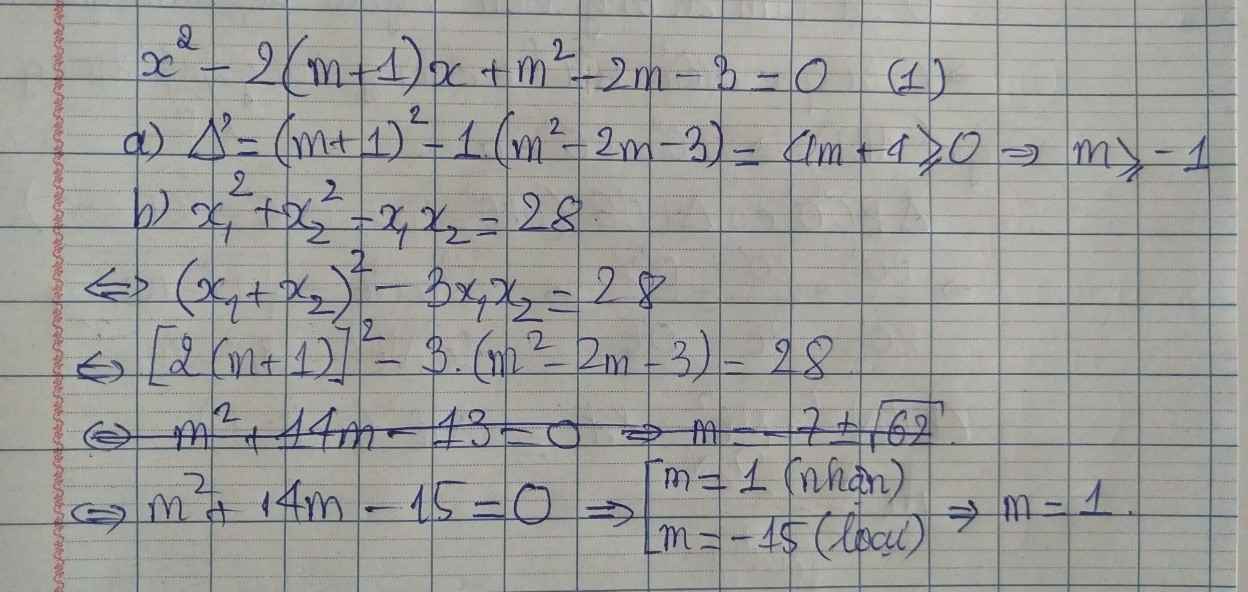Hãy nhập câu hỏi của bạn vào đây, nếu là tài khoản VIP, bạn sẽ được ưu tiên trả lời.

\(\Delta=9-4\left(-m^2+m+2\right)=4m^2-4m+1=\left(2m-1\right)^2\)
Pt có 2 nghiệm pb khi \(m\ne\dfrac{1}{2}\)
Do vai trò của 2 nghiệm là như nhau, giả sử: \(\left\{{}\begin{matrix}x_1=\dfrac{3-\left(2m-1\right)}{2}=2-m\\x_2=\dfrac{3+2m-1}{2}=m+1\end{matrix}\right.\)
\(x_1^2+x_2^2=5\Leftrightarrow\left(2-m\right)^2+\left(m+1\right)^2=5\)
\(\Leftrightarrow m^2-m=0\Rightarrow\left[{}\begin{matrix}m=0\\m=1\end{matrix}\right.\)

a)
Thế m = 2 vào phương trình được: \(x^2-4x+2+1=0\Leftrightarrow x^2-4x+3=0\)
nhẩm nghiệm có a + b + c = 0 (1 - 4 + 3 = 0) nên: \(x_1=1,x_2=\dfrac{c}{a}=\dfrac{3}{1}=3\)
Vậy phương trình có tập nghiệm \(S=\left\{1;3\right\}\)
b) \(\Delta'=\left(-2\right)^2-\left(m+1\right)=4-m-1=3-m\)
Để phương trình có 2 nghiệm thì \(\Delta'\ge0\Leftrightarrow3-m\ge0\Rightarrow m\le3\)
Theo vi ét có \(\left\{{}\begin{matrix}x_1+x_2=4\\x_1x_2=m+1\end{matrix}\right.\)
Theo đề: \(x_1^2+x_2^2=5\left(x_1+x_2\right)\)
\(\Leftrightarrow\left(x_1+x_2\right)^2-2x_1x_2-5\left(x_1+x_2\right)=0\)
\(\Leftrightarrow4^2-2\left(m+1\right)-5.4=0\)
\(\Leftrightarrow16-20-2m-2=0\)
\(\Leftrightarrow-6-2m=0\Rightarrow m=-\dfrac{6}{2}=-3\) (thỏa mãn)
Vậy m = -3 là giá trị cần tìm.
a: Khi m=2 thì pt sẽ là x^2-4x+3=0
=>x=1; x=3
b: =>(x1+x2)^2-2x1x2-5(x1+x2)=0
=>4^2-2(m+1)-5*4=0
=>-4-2(m+1)=0
=>m+1=-2
=>m=-3

1) Bạn tự giải
2) Ta có: \(\Delta=4m^2-8m+9>0\forall m\)
\(\Rightarrow\) Phương trình luôn có 2 nghiệm phân biệt
Theo Vi-ét ta có: \(\left\{{}\begin{matrix}x_1+x_2=2m-1\\x_1x_2=m-2\end{matrix}\right.\) (*)
Mặt khác: \(x_1^2+x_2^2=2018\)
\(\Leftrightarrow\left(x_1+x_2\right)^2-2x_1x_2=2018\)
\(\Rightarrow4m^2-4m+1-2m+4=2018\)
\(\Leftrightarrow4m^2-6m-2013=0\) \(\Leftrightarrow...\)
c) Từ (*) \(\Leftrightarrow\left\{{}\begin{matrix}x_1+x_2=2m-1\\2x_1x_2=2m-4\end{matrix}\right.\) \(\Rightarrow x_1+x_2-2x_1x_2=3\)
(Không phụ thuộc vào m)

Sửa đề: \(x_1^2+x_2^2+2\left(x_1\cdot x_2\right)^2=7x_1x_2\)
Ta có: \(\Delta=2^2-4\cdot1\cdot\left(m-3\right)=4-4m+12=-4m+16\)
Để phương trình có hai nghiệm phân biệt thì \(\Delta>0\)
\(\Leftrightarrow-4m+16>0\)
\(\Leftrightarrow-4m>-16\)
hay m<4
Khi m<4, Áp dụng hệ thức Vi-et, ta có:
\(\left\{{}\begin{matrix}x_1+x_2=-2\\x_1\cdot x_2=m-3\end{matrix}\right.\)
Ta có: \(x_1^2+x_2^2+2\left(x_1\cdot x_2\right)^2=7x_1x_2\)
\(\Leftrightarrow\left(x_1+x_2\right)^2-2\cdot x_1\cdot x_2+2\left(x_1\cdot x_2\right)^2=7\cdot x_1\cdot x_2\)
\(\Leftrightarrow\left(-2\right)^2-2\cdot\left(m-3\right)+2\cdot\left(m-3\right)^2=7\left(m-3\right)\)
\(\Leftrightarrow4-2m+6+2\left(m^2-6m+9\right)=7m-21\)
\(\Leftrightarrow-2m+10+2m^2-12m+18-7m+21=0\)
\(\Leftrightarrow2m^2-21m+49=0\)
\(\Leftrightarrow2m^2-14m-7m+49=0\)
\(\Leftrightarrow2m\left(m-7\right)-7\left(m-7\right)=0\)
\(\Leftrightarrow\left(m-7\right)\left(2m-7\right)=0\)
\(\Leftrightarrow\left[{}\begin{matrix}m-7=0\\2m-7=0\end{matrix}\right.\Leftrightarrow\left[{}\begin{matrix}m=7\left(loại\right)\\2m=7\end{matrix}\right.\Leftrightarrow m=\dfrac{7}{2}\left(nhận\right)\)
Vậy: Để phương trình có hai nghiệm phân biệt thỏa mãn \(x_1^2+x_2^2+2\left(x_1\cdot x_2\right)^2=7x_1x_2\) thì \(m=\dfrac{7}{2}\)
Ta có: x2 + 2x + m - 3 = 0
Theo hệ thực Vi-ét ta có:
\(\left\{{}\begin{matrix}x_1+x_2=-2\\x_1x_2=m-3\end{matrix}\right.\) (I)
Ta có: x12 + x22 + 2(x1x2)2 = 7x1x2
\(\Leftrightarrow\) (x1 + x2)2 - 2x1x2 + 2(x1x2)2 = 7x1x2 (*)
Thay (I) vào (*) ta được:
(-2)2 - 2(m - 3) + 2(m - 3)2 = 7(m - 3)
\(\Leftrightarrow\) 4 - 9m + 27 + 2(m2 - 6m + 9) = 0
\(\Leftrightarrow\) 31 - 9m + 2m2 - 12m + 18 = 0
\(\Leftrightarrow\) 2m2 - 21m + 49 = 0
\(\Leftrightarrow\) \(\left[{}\begin{matrix}m=7\\m=3,5\end{matrix}\right.\)
Vậy ...
Chúc bn học tốt!

a) \(\Delta=\left[-\left(m+3\right)\right]^2-4.1.m\\ =m^2+6m+9-4m\\ =m^2+2m+9\\ =\left(m+1\right)^2+8>0\forall m\)
Vậy phương trình luôn có 2 nghiệm phân biệt với mọi m.
b) Áp dụng hệ thức Vi-et, ta có:
\(\left\{{}\begin{matrix}x_1+x_2=m+3\\x_1x_2=m\end{matrix}\right.\)
Mà \(x_1^2+x_2^2=6\)
\(\Leftrightarrow\left(x_1+x_2\right)^2-2x_1x_2=6\\ \Leftrightarrow\left(m+3\right)^2-2m=6\\ \Leftrightarrow m^2+6m+9-2m=6\\ \Leftrightarrow m^2+4m+3=0\\ \Leftrightarrow\left(m+1\right)\left(m+3\right)=0\\ \Leftrightarrow\left[{}\begin{matrix}m=-1\\m=-3\end{matrix}\right.\)
Vậy \(m\in\left\{-1;-3\right\}\) là các giá trị cần tìm.
a, Ta có: \(\Delta=\left[-\left(m+3\right)\right]^2-4.1.m\)
\(=m^2+6m+9-4m\)
\(=m^2+2m+9\)
\(=m^2+2m+1+8\)
\(=\left(m+1\right)^2+8\)
Lại có: \(\left(m+1\right)^2\ge0\forall m\Rightarrow\left(m+1\right)^2+8\ge8\forall m\)
Vậy phương trình luôn có 2 nghiêm phân biệt
b, Theo hệ thức Vi-ét: \(\left\{{}\begin{matrix}x_1+x_2=m+3\\x_1+x_2=m\end{matrix}\right.\)
Theo bài ra:
\(x_1^2+x_2^2=6\)
\(\Leftrightarrow\left(x_1+x_2\right)^2-2x_1x_2=6\)
\(\Leftrightarrow\left(m+3\right)^2-2m=6\)
\(\Leftrightarrow m^2+6m+9-2m=6\)
\(\Leftrightarrow m^2+6m+9-2m-6=0\)
\(\Leftrightarrow m^2+4m+3=0\)
\(\Leftrightarrow m^2+m+3m+3=0\)
\(\Leftrightarrow\left(m^2+m\right)+\left(3m+3\right)=0\)
\(\Leftrightarrow m\left(m+1\right)+3\left(m+1\right)=0\)
\(\Leftrightarrow\left(m+1\right)\left(m+3\right)=0\)
\(\Leftrightarrow\left[{}\begin{matrix}m+1=0\\m+3=0\end{matrix}\right.\)
\(\Leftrightarrow\left[{}\begin{matrix}m=-1\\m=-3\end{matrix}\right.\)
Vậy với m=-1 hoặc m=-3 thì phương trinh trên thỏa mãn hệ thức

Theo viet ta có
\(\left\{{}\begin{matrix}x_1+x_2=2\left(m-1\right)\\x_1x_2=-2m\end{matrix}\right.\)
Ta có: \(x_1^2+x_1-x_2=5-2m\)
\(\Leftrightarrow x_1^2+x_1-x_2=5+x_1x_2\)
\(\Leftrightarrow\left(x_1^2+x_1\right)-\left(x_2-x_1x_2\right)=5\)
\(\Leftrightarrow x_1\left(x_1+1\right)-x_2\left(x_1+1\right)=5\)
\(\Leftrightarrow\left(x_1-x_2\right)\left(x_1+1\right)=5\)
\(\Leftrightarrow\left[{}\begin{matrix}\left\{{}\begin{matrix}x_1-x_2=1\\x_1+1=5\end{matrix}\right.\\\left\{{}\begin{matrix}x_1-x_2=5\\x_1+1=1\end{matrix}\right.\end{matrix}\right.\)
-Với \(\left\{{}\begin{matrix}x_1-x_2=1\\x_1+1=5\end{matrix}\right.\) \(\Leftrightarrow\left\{{}\begin{matrix}x_2=3\\x_1=4\end{matrix}\right.\)
\(\Rightarrow x_1x_2=12=-2m\)
\(\Rightarrow m=-6\)
-Với \(\left\{{}\begin{matrix}x_1-x_2=5\\x_1+1=1\end{matrix}\right.\) \(\Leftrightarrow\left\{{}\begin{matrix}x_2=-5\\x_1=0\end{matrix}\right.\)
\(\Rightarrow x_1.x_2=0=-2m\)
\(\Rightarrow m=0\)
Vậy \(m=0;m=-6\)
-Chúc bạn học tốt-

a: \(\Delta=\left(2m+2\right)^2-4\left(m^2-2m-3\right)\)
\(=4m^2+8m+4-4m^2+8m+12\)
=16m+16
Để phương trình luôn có nghiệm thì 16m+16>=0
hay m>=-1
b: Theo đề, ta có: \(\left(x_1+x_2\right)^2-2x_1x_2-x_1x_2=28\)
\(\Leftrightarrow\left(2m+2\right)^2-3\left(m^2-2m-3\right)=28\)
\(\Leftrightarrow4m^2+8m+4-3m^2+6m+9=28\)
\(\Leftrightarrow m^2+14m-15=0\)
=>(m+15)(m-1)=0
=>m=1


